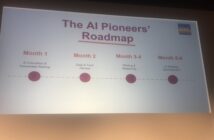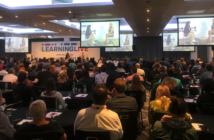UPDATE: Sukh Pabial and Andrew Jacobs have both written on this topic, so please go and read their thinking . . .
- When did we forget? by Sukh Pabial
- Who do you work with? by Andrew Jacobs
These ramblings have been prompted by a great discussion on this morning’s #LDinsight Twitter chat. The question of the day was, If you could, what gift would you give learners?
My response was to stop calling people ‘learners’. This prompted an interesting discussion, which could be interpreted as some semantic navel gazing – and maybe that is what it was!
I don’t think it is however. I hear L&D professionals talking about colleagues collectively as ‘learners’ and by so doing it suggests an ‘us’ and ‘them’ relationship. This is manifest in a lot of traditional training interventions. You (them) need management training, we (us) will provide it for you.
I can see how this has evolved. L&D professionals are professionals – they have a skills and knowledge base that enables them to help organisations become more successful. They are expert in knowing how to develop people and have vast tools and resources at their disposal in order to do this.
However, we all know that learning is not premised on classroom activities. What L&D might consider to be ‘learning’ activities has changed dramatically. We all learn from pretty much all that we do: the conversations we have, the radio we listen to, the videos we watch, the stuff we read, the accidents we have, the life experiences we have and so on.
The classroom ring fenced two things – the ‘learners’ and the ‘learned’ (trainer). The trainer had the knowledge and imparted it to the ‘learners’ – back to the us and them. However, now it is highly likely I do not need to go into a training room to learn what I need to do my job – especially if I am a knowledge worker. I can access brilliant content online and I can connect with people who can help me. Whether I have the skills and motivation to do so is a separate (and more burning issue).
Do you call yourself a ‘learner’ – at work and at home? I don’t although I know I am always learning. The reason I don’t is because I conceptualise it in the way I do eating and breathing. It is a human function we are born with – we had to be able to learn because we were born unable to see properly, speak or walk (unlike babies in the animal kingdom). We are hard wired to learn – for humans it is about survival.
So, that’s why I don’t use the term learner. And I don’t tend to hear anyone else use the term (in schools the children are called children not learners or students) unless they are in L&D.
I might be making a huge and unsubstantiated claim that using the term learners holds L&D back to the old us versus them way of doing things when L&D professionals should be focusing on us and we. Adults at work learn in so many different ways and from so many different people and this is the context within which L&D professionals now work. L&D can no longer think there is one way to help anyone or group to learn because we all learn differently. My feeling is a collective label suggests there are certain learning interventions that will suit lots of people at once. I don’t think this is true and I don’t think it has ever been true.
This is a challenge because organisations want to believe there is an ROI from L&D, that people will receive X training and it will lead to Y change in behaviour. Humans (and learning) are more complex and to turn learning into enhanced performance depends on so many other factors out of the hands of L&D such as culture, reward and recognition, motivation, who you work with and so on.
We are all in this together and we all learn differently and there are so many contextual factors that affect what and how we learn. That must be the starting point for corportae L&D. If it is, I’m not sure using the label ‘learners’ is particularly useful. And I’m not sure that what was traditionally called ‘learning’ works too.
This is a post Twitter chat ramble. Will reflect and finesse my thinking . . .




1 Comment
I am in L&D and I use the term learners, but never in the differentiated them and us way you describe. I use the term to remind people / employees / workers /managers / stakeholders (I’m trying to use my words carefully and not be judged in that) that they were, as you describe, born with an innate capacity to learn, to be open minded, to be a sponge. As adults we forget to learn, to reflect, to think. This is why a regular reminder is useful. There is no arrogance or superiority in my choice of word, it is as simple as a nod to people’s ability.